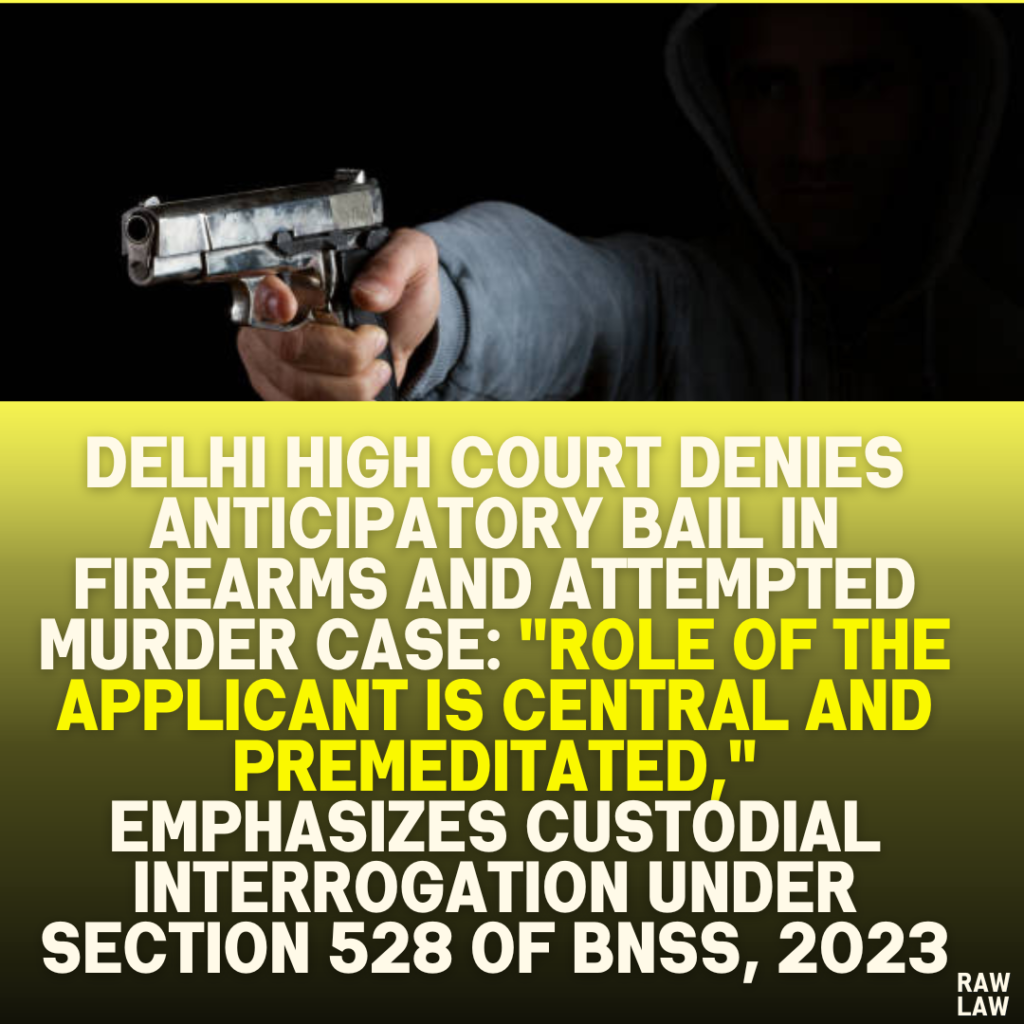Court’s Decision
The Delhi High Court dismissed the anticipatory bail application filed under Section 528 of the Bharatiya Nagarik Suraksha Sanhita, 2023 (BNSS), and Section 27 of the Arms Act. The Court held that the applicant’s custodial interrogation was essential due to the serious and premeditated nature of the allegations. The Court observed that the applicant had played a pivotal role in instigating and facilitating the crime, making him undeserving of anticipatory bail.
The Court emphasized that the principles governing anticipatory bail require the assessment of factors such as the prima facie case, the gravity of the offence, and the potential for witness intimidation or interference with the investigation. Based on these considerations, the Court dismissed the application.
Facts of the Case
The case revolved around an incident on December 31, 2024, when a PCR call was made to the Khyala Police Station, reporting vandalism of a vehicle and an attempt to set it on fire. Upon investigation, the police found a damaged car, bloodstains, and three empty cartridges at the scene. The victim, Raju, was discovered to have sustained a gunshot wound to the neck and was declared unfit to make a statement initially.
Subsequent investigation revealed that the incident occurred during the applicant’s birthday celebration. The victim later identified the applicant and others involved in the incident. According to the victim’s statement, the applicant had invited individuals possessing firearms to the gathering to intimidate the locality. These individuals allegedly fired shots in the air, and when the victim objected, the applicant instigated one of them to shoot the victim, resulting in severe injury.
The police investigation included the recovery of CCTV footage showing individuals brandishing firearms at the scene. Several co-accused were arrested following the incident, while the applicant had not yet joined the investigation at the time of the bail application.
Issues
- Whether the applicant is entitled to anticipatory bail under Section 528 of BNSS and Section 27 of the Arms Act.
- Whether the applicant’s alleged role in instigating and facilitating the crime necessitated custodial interrogation.
Petitioner’s Arguments
The applicant contended that he had no direct involvement in the firing and was merely celebrating his birthday when the incident occurred. He argued that the gunshot injury was caused by a co-accused, and no specific act of firing was attributed to him. The applicant further assured the Court of his willingness to cooperate with the investigation.
Respondent’s Arguments
The State opposed the bail application, arguing that the applicant was the principal instigator and a central figure in the offence. It was submitted that the applicant had openly declared his intent to bring armed individuals to the party and facilitated the subsequent firing. The prosecution emphasized that the gravity of the crime, the applicant’s prior criminal history, and the potential risk of witness intimidation made him undeserving of anticipatory bail. The State also argued that custodial interrogation was crucial to the investigation.
Analysis of the Law
The Court referred to the guiding principles laid down by the Supreme Court in Sumitha Pradeep v. Arun Kumar C.K. (2022 SCC OnLine SC 1529), which highlight three key factors for deciding anticipatory bail:
- Prima Facie Case: The Court must assess whether there is sufficient evidence suggesting the involvement of the accused in the crime.
- Nature of the Offence: The severity and gravity of the offence are critical considerations.
- Severity of Punishment: The potential punishment the accused may face for the alleged crime.
In applying these principles, the Court found that the applicant’s role was premeditated and pivotal. The Court noted that the applicant’s actions of calling armed individuals to a public gathering and provoking violence created a serious risk to public safety and order.
Precedent Analysis
The Court relied on Sumitha Pradeep to assess the seriousness of the allegations and the necessity of custodial interrogation. It reiterated that granting anticipatory bail in cases involving grave allegations of violence, public intimidation, and firearms could obstruct the investigation and undermine the justice process.
Court’s Reasoning
The Court observed that:
- The applicant’s actions were deliberate and premeditated, as he had actively invited individuals possessing firearms to intimidate the locality.
- The applicant was not a passive bystander but played a central role in instigating the violence and provoking the co-accused to shoot the victim.
- CCTV footage corroborated the victim’s statement, confirming that firearms were brandished and used at the applicant’s instigation.
- Custodial interrogation was necessary to uncover the full extent of the conspiracy and recover the weapons involved.
The Court highlighted the seriousness of the offence and the risks associated with granting anticipatory bail, including the potential for witness intimidation and interference with the investigation.
Conclusion
The Delhi High Court dismissed the anticipatory bail application, citing the applicant’s central role in the incident and the need for custodial interrogation. The Court clarified that its observations were limited to the bail stage and would not prejudice the merits of the case.
Implications
The judgment reinforces the principle that anticipatory bail cannot be granted in cases involving serious and premeditated offences, particularly those posing a threat to public safety. It underscores the importance of custodial interrogation in cases where the accused plays a pivotal role in the crime and highlights the judiciary’s responsibility to balance individual liberty with the needs of justice and public safety.




Pingback: Delhi High Court Refuses Interim Injunction in Trademark Infringement Case Between Two Electric Vehicle Companies, Holds ‘MAHINDRA ZEO’ Not Deceptively Similar to ‘EZIO’ - Raw Law